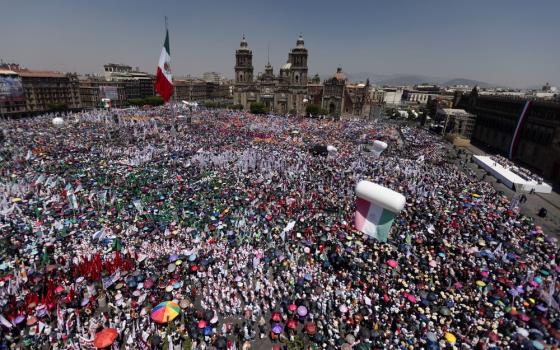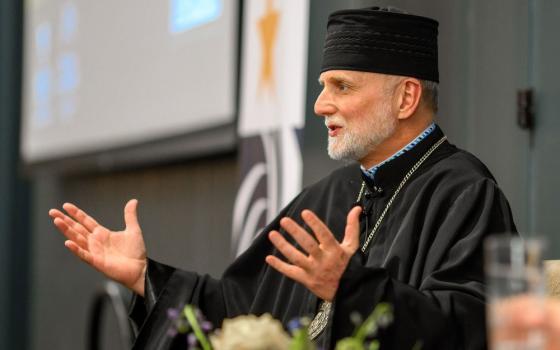A new study out of Boston College shows an increasing number of Catholic parishes serving Latinos, matching the explosive growth of this subpopulation in churches. Catholics look different than they did half a century ago -- and so do their values.
Hosffman Ospino, a Boston College assistant professor, served as the principal investigator for a national study of parishes serving Latino Catholics, who make up 40 percent of the total U.S. Catholic population. Ospino found most of these parishes serve a population dominated by immigrants. The Catholic experience in the United States, Ospino said at a recent Boston College panel, has fundamentally changed from being a white, middle-class experience to an immigrant, working-class experience, and it has come with a set of tensions about how to respond.
"What we see are thousands of parishes nationwide, and dioceses, reinventing themselves," Ospino said. His study found that 25 percent of Catholic parishes in the United States now have Hispanic ministries. They are intentionally creating new programs, outreach strategies and structures to serve their new parishioners. And, increasingly, church leaders are learning Spanish to connect with their flocks.
Ospino led a panel March 30 at Boston College organized by the college's Church in the 21st Century Center, or C21. He and two other speakers discussed the influx of Latino Catholics in recent years, the strains of deportation on Hispanic immigrant families, and the role of the church in responding to both issues. The panel discussion, "Keeping Hispanic Immigrant Families Together: Catholic Perspectives," examined the unique set of issues immigrant families face in their communities.
Attorney and panel member Mary Holper, director of the Immigration Clinic at Boston College School of Law, said it is easy on first look to think U.S. immigration law shows deep caring for families. Holper said there are three ways to earn permanent residency, and a family connection is one of them. (The other two are employer sponsorship and winning a lottery.) The only eligible family relationships for residency petitions, however, are spouses, children and, in very rare cases, siblings.
"Our definition of family, in the way immigration law defines it," Holper said, "isn't necessarily consistent with the way the rest of the world may define a family relationship or a family unit." She pointed to several former clients who were raised with cousins and by aunts or grandparents, none of whom are eligible to live in this country legally based on that family relationship.
The U.S. government further complicates matters by requiring official documentation of family ties that are not easy to come by in places like Guatemala or rural Mexico, Holper said. When people do not follow the legal channels to reunite with families in the United States, immigration enforcement agencies have increasingly resorted to deportation following lengthy detentions. Federal statistics show deportations have soared under President Barack Obama's administration, and funding of immigration enforcement activities has continued to grow, she said.
Holper described several steps Obama has taken in support of immigrant families, however. Absent immigration reform legislation, which has to come from Congress, Obama has instructed enforcement agencies to stay away from parents or legal guardians of children, students and law-abiding residents who have built their lives here. He also took action to help spouses stay together while going through the immigration process.
U.S. citizens who marry undocumented immigrants can petition for their spouses to receive green cards or citizenship. If those immigrants entered the country illegally, however, immigration law says they would have to return to their home country for 10 years before being eligible for a new status. Since the law was enacted in 1996, Holper said the government has offered a waiver to let immigrants skip the 10-year waiting period, but they could only apply from their home countries. If the waiver was not approved, they were locked out of the United States for the decade.
Holper said Obama amended the waiver application, allowing immigrants to apply and hear back about their application before leaving the country.
While there has been progress, immigrant families continue to suffer separation and instability. The U.S. Catholic bishops have consistently advocated for justice for immigrants, launching a campaign to support individuals as well as systemic reform. Pope Francis, too, has spoken out about the plight of immigrants, taking World Day of Migrants and Refugees as an opportunity to call them "gifts" and "opportunities."
Donald Kerwin Jr., director of the Center for Migration Studies of New York, served as Boston College's third and final panelist at its C21 event. Kerwin discussed the bishops' work on immigration and argued in favor of viewing immigrants as more than simply border-crossers.
Kerwin said nearly half of the 11 million undocumented immigrants have lived in this country for at least a decade, and they commit crimes unrelated to immigration in much lower rates than their citizen neighbors.
"We entrust them to care for our children, to care for our elderly, to pick our crops, to work in our yards and to build our homes," Kerwin said.
As Latino families continue to increase their share of the Catholic population in the United States, Kerwin said he believes churches should embrace them: embrace the ideal of forgiveness the church holds at its core and embrace the opportunities for renewal embedded in the influx of a new group of people with fresh perspectives, traditions and values.
Ospino's report on Hispanic-serving parishes says there is much work to be done. It calls on churches to improve the levels of integration between Latinos and their counterparts. It also argues that dioceses must give higher priority to allocating resources to the evangelization of Hispanic Catholics, and says they must shift away from relying on volunteers to serve this population.
While new responsibilities may seem overwhelming for church leaders dealing with significant demographic change in a relatively short period of time, Kerwin encouraged Catholics to see immigrants for the opportunities they represent.
"Not a problem, a solution. Not a burden, a gift," Kerwin said. "That's the Catholic vision."
[Tara García Mathewson is a freelance writer based in Boston.]



